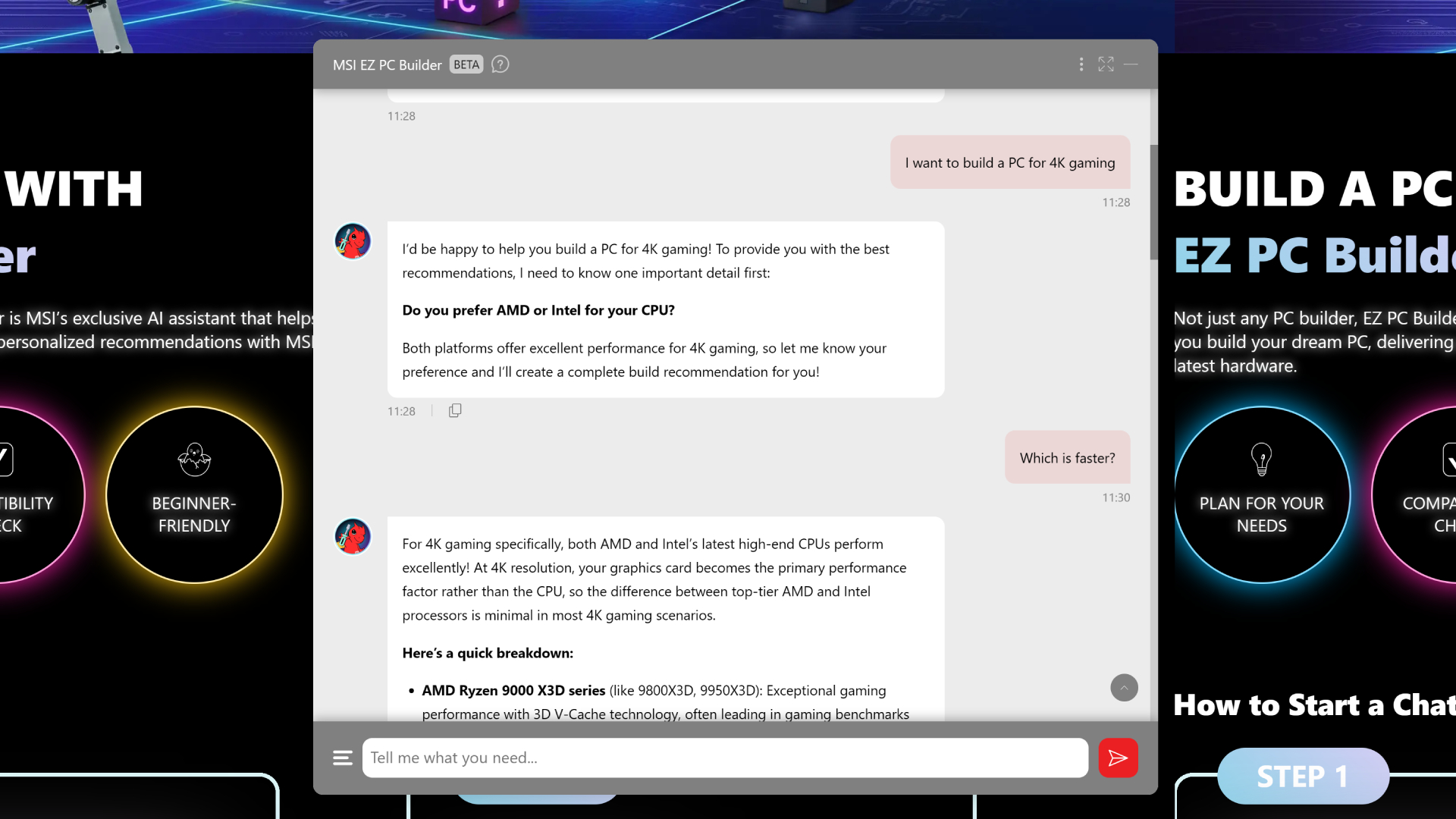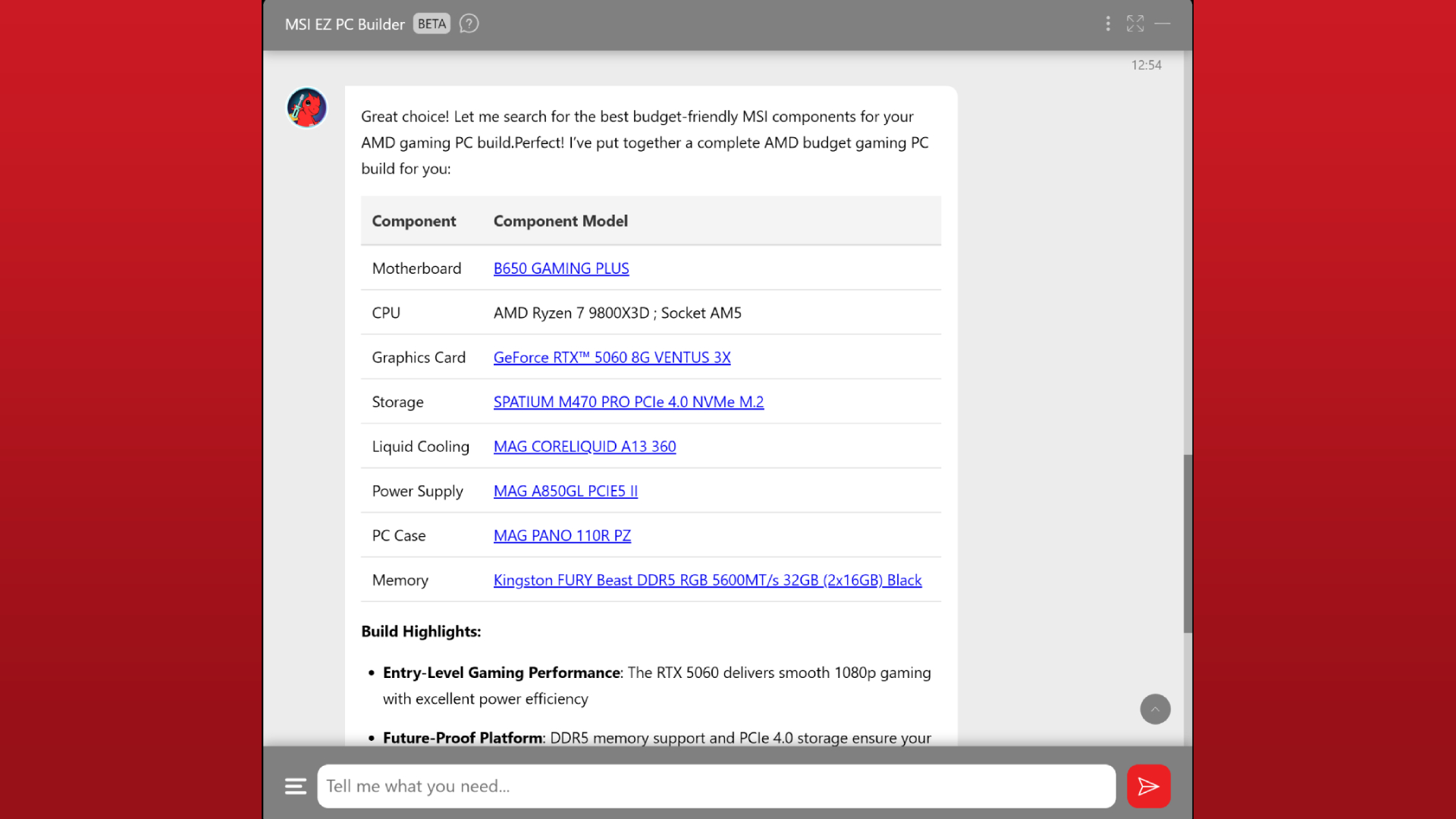I tested the beta version of MSI's beginner-friendly, AI-powered EZ PC Builder, and it told me the 9800X3D was the perfect chip for a budget gaming PC
It also loves to recommend MSI components, to the surprise of no one.
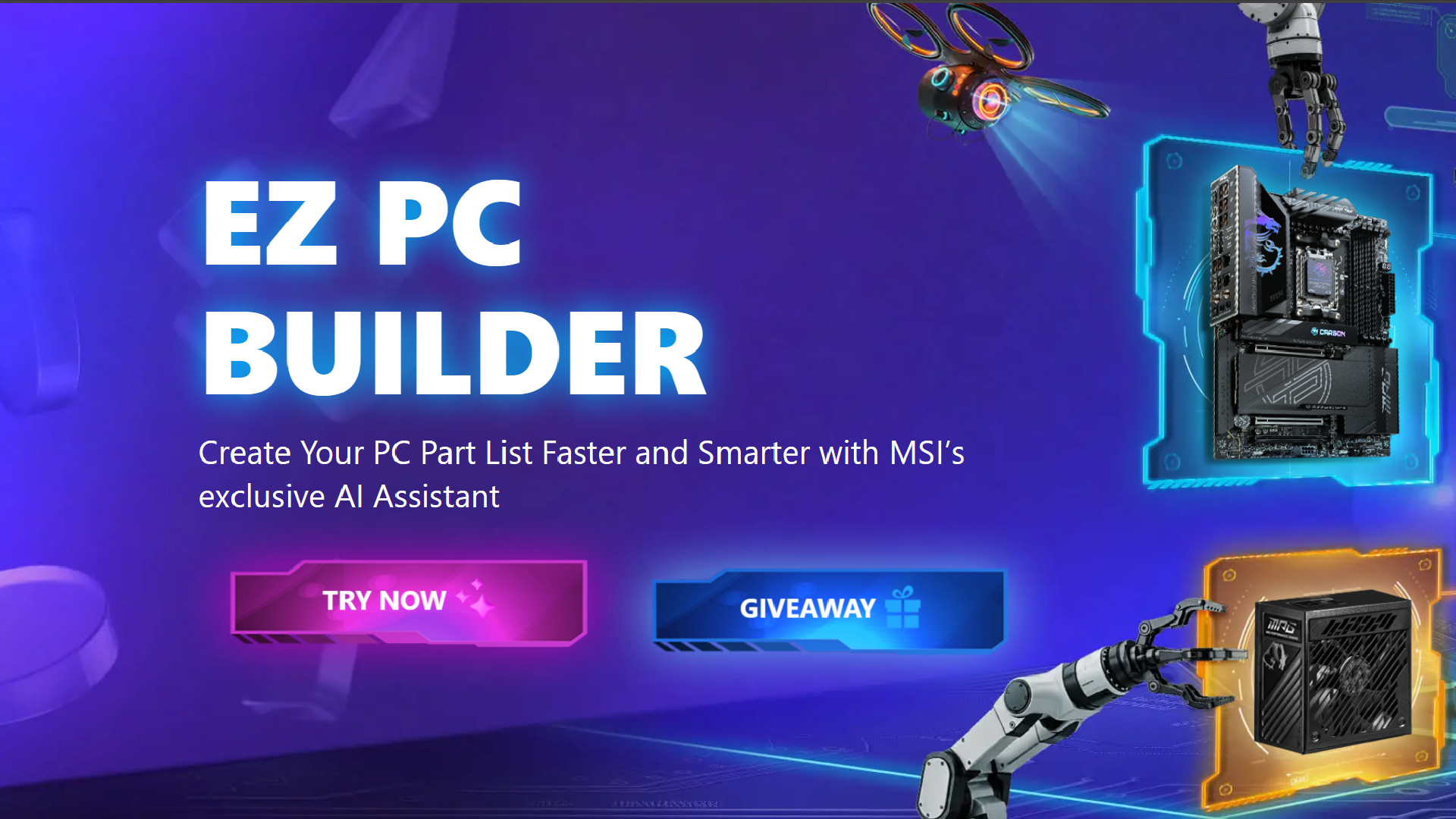
Keep up to date with the most important stories and the best deals, as picked by the PC Gamer team.
You are now subscribed
Your newsletter sign-up was successful
Want to add more newsletters?

Every Friday
GamesRadar+
Your weekly update on everything you could ever want to know about the games you already love, games we know you're going to love in the near future, and tales from the communities that surround them.

Every Thursday
GTA 6 O'clock
Our special GTA 6 newsletter, with breaking news, insider info, and rumor analysis from the award-winning GTA 6 O'clock experts.

Every Friday
Knowledge
From the creators of Edge: A weekly videogame industry newsletter with analysis from expert writers, guidance from professionals, and insight into what's on the horizon.

Every Thursday
The Setup
Hardware nerds unite, sign up to our free tech newsletter for a weekly digest of the hottest new tech, the latest gadgets on the test bench, and much more.

Every Wednesday
Switch 2 Spotlight
Sign up to our new Switch 2 newsletter, where we bring you the latest talking points on Nintendo's new console each week, bring you up to date on the news, and recommend what games to play.

Every Saturday
The Watchlist
Subscribe for a weekly digest of the movie and TV news that matters, direct to your inbox. From first-look trailers, interviews, reviews and explainers, we've got you covered.

Once a month
SFX
Get sneak previews, exclusive competitions and details of special events each month!
Building a gaming PC for the first time can be a daunting process, so it's no surprise we're starting to see AI tools enter the arena, providing custom recommendations of exactly what to buy and how to put it together. I've been testing out one of the newest: The beta version of MSI's AI-powered EZ PC Builder tool, which promises to "guide beginners to complete PC configuration easily"—and while my early tests were surprisingly promising, like most AI helpers, it could certainly do with some work.
I started out by telling it I wanted to build a PC for 4K gaming, to which it asked me what CPU I would prefer—AMD or Intel. Hmm. A slight fall at the first hurdle, that, as I'd imagine many beginners wouldn't know the difference between the two. Or even what "CPU" might stand for, for that matter.
Playing dumb, however, and asking which was faster, resulted in a surprisingly measured response. "For 4K gaming specifically, both AMD and Intel’s latest high-end CPUs perform excellently!" said the AI. "At 4K resolution, your graphics card becomes the primary performance factor rather than the CPU, so the difference between top-tier AMD and Intel processors is minimal in most 4K gaming scenarios."
That's pretty good advice, I reckon. It then went on to espouse the virtues of the AMD Ryzen 9000X3D-series compared to the Intel Core Ultra 9 range, and told me that the biggest factor was my budget. I then asked which was the cheaper of the two, which is where the tool revealed its first major weakness—it doesn't have access to pricing information, in the same way something like Newegg's (also AI-powered, also still in beta) PC Builder does.
Still, asking it to put together two 4K gaming builds, one Intel, one AMD, resulted in two perfectly reasonable component lists, both featuring the MSI GeForce RTX 5080 16G Gaming Trio OC. That's certainly a GPU that can handle 4K gaming, although as someone that answers this sort of question on a daily basis, I feel duty-bound to point out that at 4K, you're still going to need to enable DLSS and potentially Multi Frame Generation to get smooth frame rates in some of the more demanding games.
Which is the sort of context a beginner builder might not be aware of. Still, it's nice to see it didn't go the whole hog and recommend a monstrously expensive RTX 5090 by default, as I didn't give it a budget to work with. The RTX 5080 is the more sensible buy for most people looking to game at 4K, so it definitely earns points there.
Although I'd be remiss if I didn't point out an important fact—any RTX 5080 from a respected manufacturer will do. This might sound like a very obvious thing to say, but would you believe it, the MSI EZ PC Builder appears to recommend mostly MSI components. Or at the very least, if MSI makes it, the tool will usually recommend it. Which all makes sense, doesn't it?
Keep up to date with the most important stories and the best deals, as picked by the PC Gamer team.
I mean, I'd fall out of my chair if it suggested, say, an Asus motherboard over an MSI version. Still, this brand bias limits the end-user benefits quite considerably, and while I have nothing against MSI components, I'd never recommend that a first-time builder bought equipment exclusively from one manufacturer.
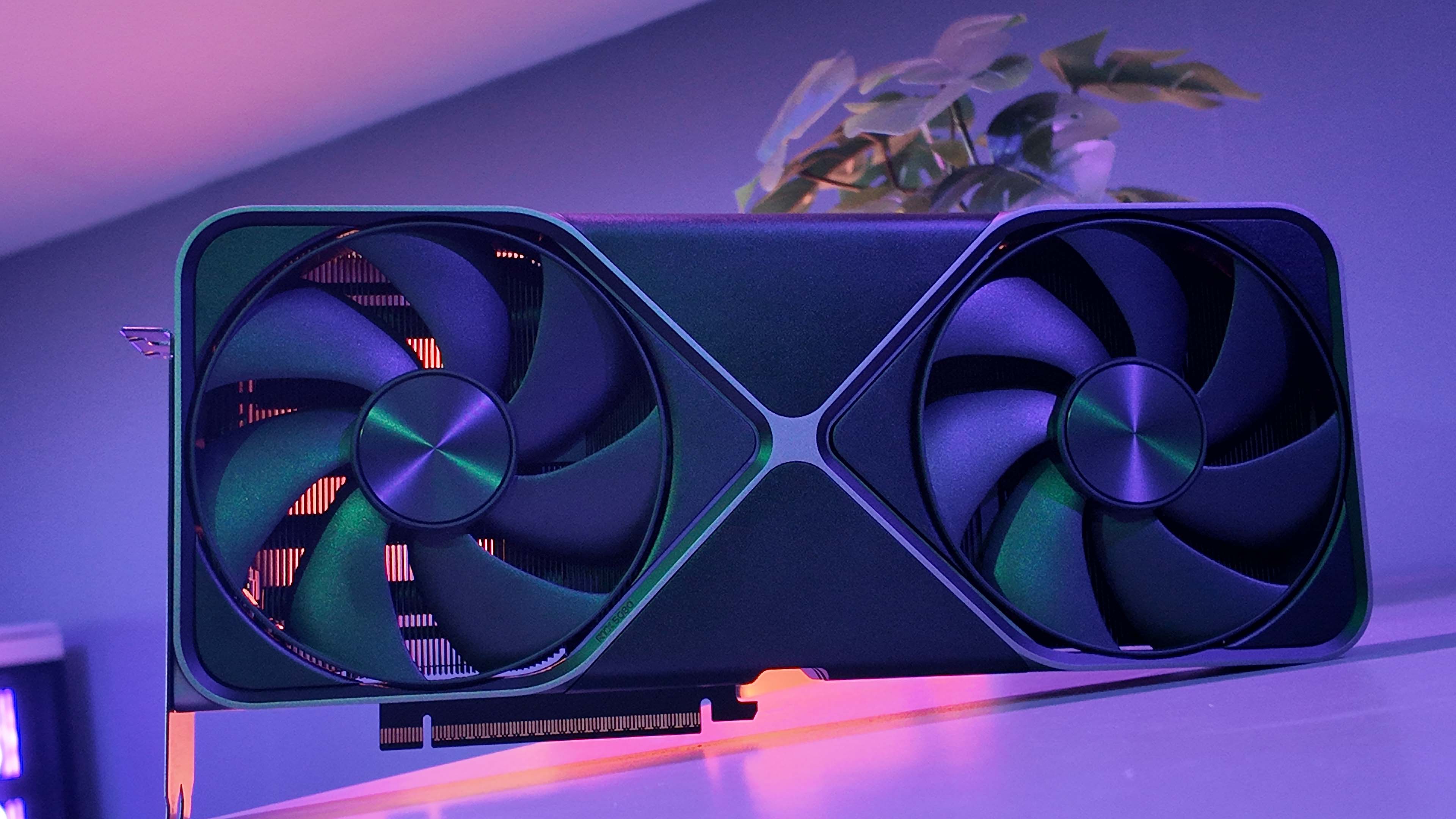
Switching to the opposite end of the spectrum, I started a new session and told it I'd like to build a gaming PC on a tight budget. This time, I told it directly that I didn't know the difference between AMD and Intel, and it made a choice for me:
"AMD is generally the better choice for budget gaming builds," it said, before detailing the benefits of a budget AMD gaming CPU over Intel. Chief among its points was the idea that you get more value for money out of a budget AMD chip thanks to a higher number of cores and threads at lower price points, although it did point out that Intel chips have strong single core performance.
Hmm. While I'm not saying that advice is wrong in general (budget AMD chips are indeed great performers and are generally good value), it's still possible to buy a perfectly decent (and many-cored) Intel chip for a good price, if you're prepared to do some bargain hunting. Again, the MSI tool only has a rough idea of pricing, not an up-to-date list, so this is forgivable—and if I was talking to a friend about the same subject I'd recommend a budget AMD chip, too, like the AMD Ryzen 5 7600X.
I then asked it to spec out the AMD budget build it had recommended, and this is where the metaphorical wheels came off. It merrily responded by speccing out a machine with… an AMD Ryzen 7 9800X3D. The same chip it picked in the 4K mega build, in fact, and one that's currently retailing for $460.
"That's a very expensive CPU," I responded. "You're absolutely right!" said the AI. "The Ryzen 7 9800X3D is definitely NOT budget-friendly. Let me search for a more appropriate budget CPU option for your build. You’re absolutely right - my apologies!"
It then went on to recommend the much-more-suitable AMD Ryzen 7 7500F, in combination with an RTX 5060 and a budget motherboard, power supply, and SSD, along with a 360 mm liquid cooler. That's a bit overkill on the cooling front, perhaps, but it would otherwise make for a reasonable budget setup—although you'd definitely be able to save a considerable amount of cash by shopping around for the best deals, and without tying yourself to one brand.
Here's a piece of advice from me, an actual human being, on one of the most important things you can do when speccing out a PC: shop around
So, when it comes to component recommendations the MSI tool is far from perfect, which is no surprise given it's still in beta. That being said, it's already capable of giving some very good advice to beginner builders, which was at least pleasing to see.
I asked it what the biggest thing to be aware of was when building a PC for the first time, and it gave me a list of most of the potential pitfalls, including component compatibility, correct PSU wattage, and case sizing.
It also gave good general assembly tips, like being careful to ground yourself, installing components carefully without forcing them, and even recommended watching a video to familiarise yourself with the basics before you get started. "Don’t rush - take your time and enjoy the process!" Said the AI. I couldn't agree more.
But, while I'm sure the recommendations will improve in time as the tool is tweaked, I still can't quite get past the idea of a massively brand-biased AI giving first-time builders the wrong idea.
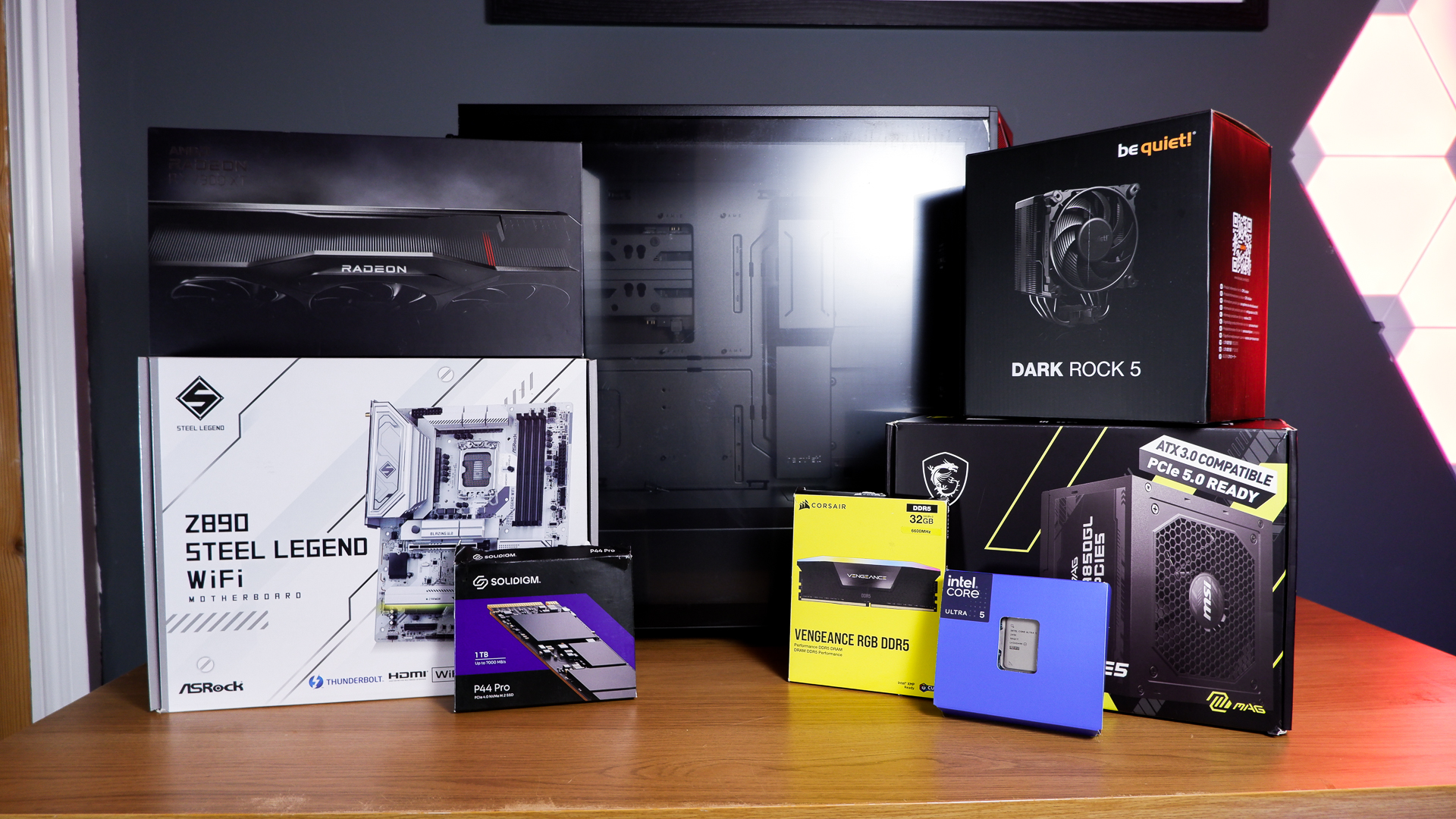
Here's a specific piece of advice from me, an actual human being, on one of the most important things you can do when speccing out a PC build: shop around. While MSI makes some great components (we recommend a lot of them, in fact), there are many trustworthy component brands on the market—like Gigabyte, Asus, and ASRock, to name just a few.
And mixing and matching your component manufacturers is one of the easiest ways to save a considerable amount of cash. We've got a ton of hand-written guides for this sort of thing, from individual components like the best gaming CPU or the best gaming motherboard, all the way up to fully-fledged guides on how to put our example builds together.
Or, you could simply hang the whole affair and go for a great deal on a prebuilt gaming PC instead, and upgrade from there. Whichever route you choose, I'll always recommend independent advice from the experts, rather than AI-garnered recommendations from a specific brand. As I think I've proven, you might not be getting entirely the full picture.
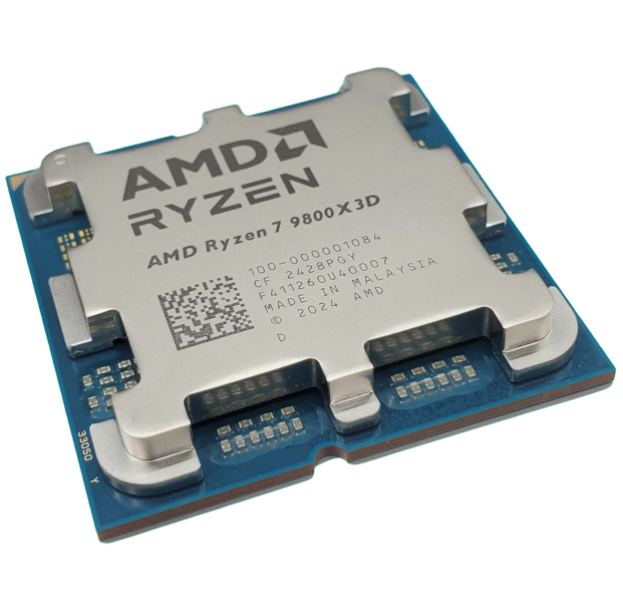
1. Best CPU: AMD Ryzen 7 9800X3D
2. Best motherboard: MSI MAG X870 Tomahawk WiFi
3. Best RAM: G.Skill Trident Z5 RGB 32 GB DDR5-7200
4. Best SSD: WD_Black SN7100
5. Best graphics card: AMD Radeon RX 9070

Andy built his first gaming PC at the tender age of 12, when IDE cables were a thing and high resolution wasn't—and he hasn't stopped since. Now working as a hardware writer for PC Gamer, Andy spends his time jumping around the world attending product launches and trade shows, all the while reviewing every bit of PC gaming hardware he can get his hands on. You name it, if it's interesting hardware he'll write words about it, with opinions and everything.
You must confirm your public display name before commenting
Please logout and then login again, you will then be prompted to enter your display name.
